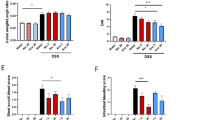Abstract.
Smoking has a dichotomous effect on inflammatory bowel disease, ameliorating disease activity in ulcerative colitis but having a deleterious effect on Crohn's disease. This effect is thought to be due to nicotine. We investigated the effect of chronic nicotine administration on the small and large bowel in iodoacetamide-induced jejunitis and colitis. Jejunitis was induced in Sprague-Dawley rats by intrajejunal administration of 0.1 ml 2% iodoacetamide and colitis by intrarectal administration of 0.1 ml 3% iodoacetamide. Nicotine was dissolved in drinking water (12.5 or 250 µg/ml), rats drinking ad libitum. Nicotine administration started 10 days prior to damage induction and throughout the experiment and had no effect on weight gain or daily food intake of rats. Rats were killed 5 days after iodoacetamide-induced colitis and 7 days after induction of jejunitis. The jejunum and colon were resected, rinsed, weighed, damage assessed macroscopically and microscopically and tissue processed for myeloperoxidase and nitric oxide synthase (NOS) activities and prostaglandin E2 (PGE2) generation. Effects of nicotine on gut microcirculation were also assessed. Nicotine by itself caused no damage to the colon. Nicotine had a dichotomous effect on jejunitis and colitis. At a dose of 12.5 µg/ml nicotine improved the macroscopic damage of colitis from 252±66 to 70±31 mm2, and segmental weight also declined significantly in the colon (from 1.7±0.2 to 1.2±0.1 g/10 cm). In contrast, the same dose of nicotine had a deleterious effect on iodoacetamide-induced jejunitis, increasing the macroscopic damage from 368±38 to 460±97 mm2 in rats treated with injury escalating to 970±147 in rats treated with 250 µg/ml nicotine. Nicotine treatment also significantly increased jejunal segmental weight. By itself nicotine did not change NOS activity or PGE2 generation compared to control rats, but it enhanced microcirculation in the colon, whereas in the jejunum nicotine decreased PGE2 generation and increased NOS activity but not jejunal microcirculation. Nicotine has opposite effects on iodoacetamide-induced colitis and jejunitis, which may be partly explained by decreased PGE2 generation and increased NOS activity in the jejunum and an increase in the colonic microcirculation.
Similar content being viewed by others
Author information
Authors and Affiliations
Additional information
Electronic Publication
Rights and permissions
About this article
Cite this article
Eliakim, R., Karmeli, F., Cohen, P. et al. Dual effect of chronic nicotine administration: augmentation of jejunitis and amelioration of colitis induced by iodoacetamide in rats. Int J Colorectal Dis 16, 14–21 (2001). https://doi.org/10.1007/s003840000262
Accepted:
Published:
Issue Date:
DOI: https://doi.org/10.1007/s003840000262




